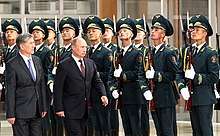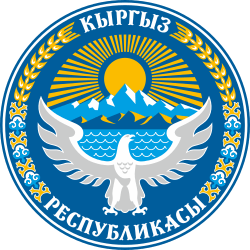Kyrgyzstan–Russia relations
Kyrgyzstan–Russia relations is the relationship between the two countries, Kyrgyzstan and Russia.
 | |
Kyrgyzstan |
Russia |
|---|---|
History
Whereas the other Central Asian republics have sometimes complained of Russian interference, Kyrgyzstan has more often wished for more attention and support from Moscow than it has been able to obtain. For all the financial support that the world community has offered, Kyrgyzstan remains economically dependent on Russia, both directly and through Kazakhstan. In early 1995, Askar Akayev, the then President of Kyrgyzstan, attempted to sell Russian companies controlling shares in the republic's twenty-nine largest industrial plants, an offer that Russia refused.[1]
Akayev has been equally enthusiastic about more direct forms of reintegration, such as the Eurasian Union that the President of Kazakhstan, Nursultan Nazarbayev, proposed in June 1994. Because Kyrgyzstan presumably would receive much more from such a union than it would contribute, Akayev's enthusiasm has met with little response from Russia and the other, larger states that would be involved in such an arrangement. Akayev's invitation for Russian border guards to take charge of Kyrgyzstan's Chinese border, a major revision of his policy of neutrality, was another move toward reintegration.[1]
The Kyrgyzstani government also has felt compelled to request Russia's economic protection. The harsh reality of Kyrgyzstan's economic situation means that the nation is an inevitable international client state, at least for the foreseeable future. Despite concerted efforts to seek international "sponsors," Akayev has not received much more than a great deal of international good will. Even if the president had not lived seventeen years in Russia himself and even if his advisers, family, and friends were not all Soviet-era intellectuals with a high degree of familiarity with Russia, economic necessity probably would push Kyrgyzstan further toward Russia.[1]

On his February 1994 visit to Moscow, Akayev signed several economic agreements. Having promised the republic a 75 billion ruble line of credit (presumably for use in 1994) and some US$65 million in trade agreements, Russia also promised to extend to Kyrgyzstan most favoured nation status for the purchase of oil and other fuels. For its part, Kyrgyzstan agreed to the creation of a Kyrgyz-Russian investment company, which would purchase idle defence-related factories in the republic to provide employment for the increasingly dissatisfied Russian population of Kyrgyzstan. In early 1995, Prime Minister Apas Jumagulov of Kyrgyzstan and Prime Minister Viktor Chernomyrdin of Russia signed a series of agreements establishing bilateral coordination of economic reform in the two states, further binding Kyrgyzstan to Russia. After lobbying hard for inclusion, Kyrgyzstan became a member of the customs union that Russia, Belarus, and Kazakhstan established in February 1996.[1]
For its part, Russia sees aid to Kyrgyzstan as a successful precedent in its new policy of gaining influence in its "near abroad," the states that once were Soviet republics. Russia does not want a massive in-migration of Russians from the new republics; some 2 million ethnic Russians moved back to Russia between 1992 and 1995. Akayev, on the other hand, must find a way to stem the loss of his Russian population, which already has caused an enormous deficit of doctors, teachers, and engineers.[1]

For these reasons, despite opposition from Kyrgyz nationalists and other independence-minded politicians, in 1995 Akayev granted the request of Russian president Boris Yeltsin to review the constitutional provision making Kyrgyz the sole official language. Early in 1996, Kyrgyzstan took legal steps toward making Russian the republic's second official language, subject to amendment of the constitution. That initiative coincided with the customs union signed with Russia, Kazakhstan, and Belarus in February 1996. The long-term success of Akayev's search for reintegration is questionable because of Kyrgyzstan's minimal strategic importance and the potential cost to an outside country supporting the republic's shaky economy.[1]
In February 2009 the Russian government pledged to write off Kyrgyzstan's $180 million debt as well as promising to lend a further $2 billion, give $150 million in direct aid and subsidise the building of the Kambarata-1 hydropower plant at the Kambaratinsk Dam.[3]
Russia has an embassy in Bishkek and a consulate in Osh, and Kyrgyzstan has an embassy in Moscow, a consulate in Ekaterinburg, and a vice-consulate in Novosibirsk.
Economic Cooperation
Both Kyrgyzstan and Russia are members of the Eurasian Economic Union.[4] In March 2019, the Russian government announced that it would give Kyrgyzstan a $30 million (USD) in economic and military aid to Kyrgyzstan.[5]
Military cooperation

Since 2003, Russian Air Force units have been stationed at Kant Air Base east of Bishkek. On 20 September 2012 Russia and Kyrgyzstan signed an agreement in which Russia is allowed to have a joint military base in Kyrgyzstan for 15 years starting from 2017. The agreement was signed in Bishkek between Vladimir Putin and Almazbek Atambayev. Putin stated that the joint military base will be a significant factor adding to the stability in the country and the whole region.[6]
References
- Martha Brill Olcott. "Russia". Kyrgyzstan: a country study (Glenn E. Curtis, editor). Library of Congress Federal Research Division (March 1996). This article incorporates text from this source, which is in the public domain.
- Sebastien Peyrouse, Economic Aspects of China-Central Asia Rapprochment Archived 2009-02-07 at the Wayback Machine. Central Asia - Caucasus Institute, Silk Road Studies Program. 2007. p.18.
- China, US, Russia eye Bishkek
- "Eurasian Economic Union member nations". Eurasian Economic Union.
- https://www.themoscowtimes.com/2019/03/28/russia-gives-kyrgyzstan-30m-grant-as-putin-visits-ally-a64986
- "Russia, Kyrgyzstan seal military base agreement". RT. 20 September 2012. Retrieved 20 September 2012.

_04.jpg)

